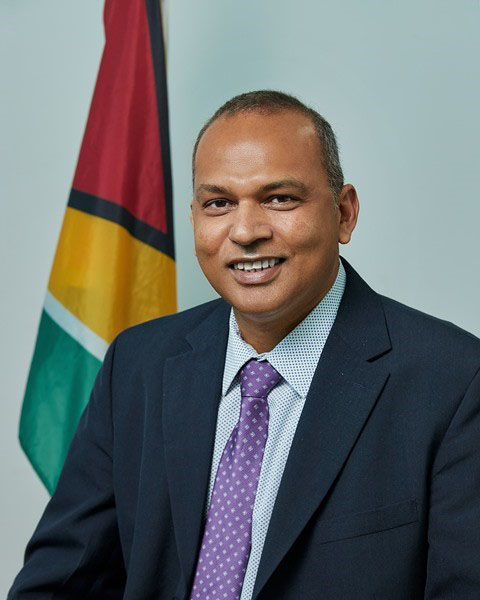Government on Wednesday tabled a bill that once enacted will see the regulation of nurses, midwives, nursing assistants and specialists nurses, among other things.
Minister of Health Dr. Frank Anthony presented the Nurses and Midwives Bill 2022 for its first reading.
The bill, which repeals the Nurses and Midwives Act, provides for the establishment of Nurses and Midwives Council to oversee the profession, including the registration and certification of nursing personnel; development of a code of ethics and conduct for nursing personnel and monitoring compliance; and exercise of disciplinary control.
It would also be responsible for establishing standards of education, training, conduct and performance for nursing personnel and to ensure the maintenance of those standards; promoting the interests of nursing personnel; advising the Minister on matters related to nursing personnel; and performing any other functions as may be conferred on it by law.
The council will consist of fifteen members appointed by the minister and shall elect from among its members a Chairperson, a Vice Chairperson and any other officers as it considers fit. It will include among other persons the Chief Nursing Officer; the Director of Nursing at the Georgetown Public Hospital; and representatives of the Guyana Nursing Association, the Midwives Association, the University of Guyana’s Nursing Programme, the Health Sciences Education at the Ministry of Health, the School of Nursing, a private nursing school, and civil society.
The members who are not ex-officio shall hold office for a period of three years and shall not be eligible for re-appointment or re-election.
Part Three of the bill deals with registration and licensing. “This part creates a requirement for registration and licensing before a person practices nursing (including specialist nursing) or midwifery and registration may be full or temporary,” the bill’s explanatory memorandum states.
It outlines the application process for registration and a person’s entitlement on registration as well as the application process for licensing. It also informs that issuance of a licence may be refused and a valid licence may be revoked or suspended.
Further, Part Three makes provisions for registers to be kept by the Council and also for a list of nursing and midwifery personnel who have been licenced to be published in the Gazette yearly. Failure to renew a licence within a three-month period after expiration would result in a fine being imposed, if the bill is enacted as is.
Part Three of the bill also highlights that a person shall not practice nursing or midwifery in Guyana unless that person is registered and holds a valid licence issued under the law.
Once the Council is satisfied that the applicant has met the requirement, it said a one-year licence would be issued. Part Three also outlines the circumstances under which a licence may be refused and revoked.
Section 23 (1) of the bill states “Where the Council suspends or revokes the licence of a nursing personnel, the revocation shall take effect from the date the council may direct and the licence shall be surrendered to the council within twenty-eight days”.
Section 23(2) adds, “A person who refuses or neglects to give up a revoked or suspended licence commits an offence and is liable on summary conviction of a fine of one hundred and fifty thousand dollars and to imprisonment for three months.”
Meanwhile, Section 24 of the bill states “Where a licence has been revoked, the former holder of the licence may apply for re-registration after a period of two years from the date of removal of the former holder’s names from the register”.
Part Four of the bill seeks to establish a Disciplinary Committee and sets out its composition and procedure.
According to Section 35 (1), the Nurses and Midwives Disciplinary Committee is charged with the duty of upholding standards of professional conduct. “The Disciplinary Committee shall comprise of five members of the Council and one of those members shall be the legal representative,” Section 35 (2) adds.
The bill’s explanatory memorandum states “provision is made for a person aggrieved by a nursing personnel’s act of professional misconduct to make a complaint to the Committee. Also, this part provides that where a complaint is made the Commit-tee shall submit a report to the Council and make recommendations”.
Additionally, it says disciplinary action may be taken against nursing personnel convicted of an offence. “This Part also provides that a person’s name may be removed from the Register by the Council or on request by the nursing personnel. Further disciplinary action may be taken where any nursing personnel has been convicted of an offence or is guilty of grave professional misconduct”.
According to section 47 of the bill, “Where any registered nursing personnel has been found guilty of professional misconduct, the Council may, in addition to any other penalty prescribed under this Act, impose a fine not exceeding one hundred thousand dollars”.
Part Five of the bill deals with offences and penalties. “This part creates several offences and penalties including, practicing nursing or midwifery without being registered and licensed, fraudulently procuring or attempting to procure registration using false or fraudulent representation and directly or indirectly holding oneself out as being a nursing personnel. Provision is also made for penalties to be imposed in cases of professional misconduct,” the bill explanatory memorandum states.
The bill says that any individual who practices nursing and midwifery in Guyana without being registered and holding a valid licence or any specialty of nursing without being registered as a specialist nurse “commits an offence”.
They can be subject to a fine of five hundred thousand dollars and imprisonment to twelve months.
Part Six of the bill, among other things, makes provision for repeal of the Nurses and Mid-wives Act No. 11 of 2019, for the minister to make regulations to give effect to the bill once enacted and other specified matters. This part further provides for transitional provisions to deal with the current members of the Council, pending the establishment of the Council envisaged under the bill.






